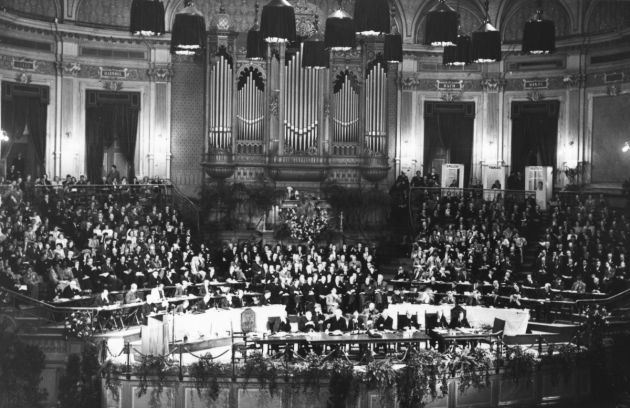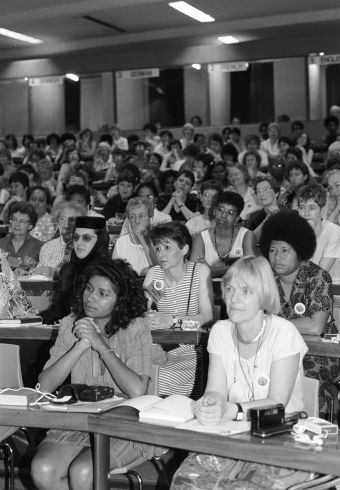Men, women; war, peace; poverty, justice are issues for world churches

CANTERBURY, England – The whole world is living in uncertain times.
That includes the world's churches, buffeted by the same economic and demographic tides that affect all.
So that should heighten the conversations when thousands of Christians converge on the southern tip in Korea for the 10th World Council of Churches Assembly.
Held about once every seven years, the WCC Assembly is the highest governing body of the church grouping representing some 560 million Christians from 345 member churches from more than 100 countries.
"This Assembly in Busan is an opportunity for the member churches of the WCC to reaffirm and refresh their commitment to one another in uncertain times," said Rev. Sheilagh Kesting, who is the head of ecumenical relations for the Church of Scotland, and was moderator of its General Assembly from 2007-2008.
Since the first Assembly in 1948, the WCC has chosen themes that are not only poetic but practical.
FIRST ASSEMBLY 1948 IN AMSTERDAM
In 1948, the WCC was founded. It's theme in Amsterdam coming soon after World War II was "Man's Disorder and God's Design which as close as you can get to the theme of the coming assembly which is "God of Life, lead us to justice and peace."
Many dedicated Christians believe will be a forum for discussion on some of the great issues bewildering a now largely secular world where many citizens say the promises of politicians are seen as little more than puffs of hot air.
Along with another year of global economic uncertainty, conflict in the Middle East region that is spreading in Africa is pervading and sporadic spikes of tension continue to haunt the area around the Korean peninsula.

Speaking from Edinburgh, she told Ecumenical News, in uncertain times such as these, when ecumenical commitment in the West seems uncertain and in the doldrums "this reaffirmation is a vital part of keeping our horizons wide."
Her hopes for the October 30 to November 8 meeting in Busan, Korea's second biggest city?
"We will be looking for a strong united statement to help us focus on why it is important to continue to put energy and resources into the World Council," said Kesting.
One of the moderators at the July 2013 assembly of the Conference of European Churches, a regional body, in Budapest, Kesting said, "Through the WCC we extend the sphere of our influence in addressing the needs of our world way beyond what we can do on our own - not just because that is a good thing to do but because it is the necessary outworking of the faith we share.
RENEWED EFFORT
"There will be people at the Assembly who will be seeking a renewed effort form the churches to address the urgency of climate change, which is already adversely affecting their lives and livelihoods."
Kesting noted that movement on climate change also needs movement in other areas – "on the global economy, environmental issues and on addressing poverty through education, empowerment and advocacy.
"We will be looking for signs of a deeper understanding and a movement away from old arguments."
She believes that the movement away from "old arguments", a hangover from the Cold War era, will give the 10th Assembly of the WCC its bite: not only on issues surrounding the environment but also on the explosive situations in the Middle East and Africa.
"With so much violence in the world both in terms of war and in terms of the violence of abuse and exclusion, the discussion of the just peace will be important for us too.
"Again, we do not expect it to be easy but we do know that peace is not silence or ignoring injustice and as churches we need a common voice ad credible way of resolving conflict and building strong communities or respect."
DAME MARY TANNER
The theme of the Assembly "God of Life, lead us to justice and peace" is totally relevant theme in today's world than this, said Dame Mary Tanner.
She is the long serving European president of the WCC and a respected Christian leader and academic in her home country, the United Kingdom.
"Issues will be focused around justice for all with a special emphasis on economic justice, a concern for gender justice and a strong emphasis on eco justice," Tanner told EN in an interview.
"Another set of issues will be around peace with emphasis on the Middle East – on Syria, Egypt and an on-going concern for Israel/Palestine, for Nigeria and because of the location of the Assembly, the division of North and South Korea will never be far from the delegates' minds."
She said that the on-going plight of asylum seekers, displaced people, refugees and migration will also be much on people's minds and in their hearts when the Assembly opens.
"I think, we shall see the fellowship of churches turned outwards, thinking of service together in a world where injustice is rife and peace is shattered by war and threats of war, even nuclear war."
And at one of the most important and timely religious meetings of this decade, Christian identity in a multi-faith context is also likely to surface as an important issue.
Said Tanner, "So, there will be an issue about the inextricable relations of the unity of the Church, the unity of the human community and the unity of all creation."
PRESENCE OF WOMEN

The presence of women at the 2013 Assembly will be strong, their voice loud.
Given that females make up well over half the world's population, more and more Christians demand that they play a greater role within the Church.
The ordination of female priests and consecration of women as bishops in some churches remains an explosive issue in certain so-called traditionalist and largely male groups.
The non-Christian world often looks on – bemused or indifferent to such sexual hair-splitting and clerical in-fighting.
This "particular emphasis on women" comes at a time when the marginalization of women pervades in many parts of the world remaining as a running sore.
"It's vital we look at the relationship between men and women everywhere," said Christina Rees, the American-born Christian leader and member of the Archbishop's Council of the Church of England who is one of Britain's most prominent advocates for the consecration of women bishops.
She told EN that in parts of the world one in every four women fears domestic violence, and that is one of the most common causes for suicide in the 18-25 age group.
"We must address the dynamic between men and women. Homes must be safe places. There are so many issues.
"We have to identify the problem of young girls wanting to conform to a particular style of beauty and reject these so-called 'surgeries' whose job it is to take a natural, home grown beauty and turn her into some sort of American pop star.
"That's shameful. And men everywhere must learn that being gentle and kind to women is being a real man. The old definitions of 'man' and 'woman' have not served us well at all.
"To change things we have to organize ourselves properly. We can get together to run the Olympics – so why not to eliminate poverty and hunger?"
POVERTY AND INJUSTICE
The head of advocacy for the British-based Christian Aid, a member of the ACT Alliance, Dionne Gravesande, said the Assembly will be an opportunity for churches to speak up on issues of injustice affecting people around the world.
"The timing of the 10th Assembly is significant as it comes at a time when negotiations on the post 2015 global development framework are moving towards conclusions and climate change negotiations are reaching a critical point.
"The global churches can decide if they want to be in the forefront of shaping the 2015 world, or if they want to retreat into denominational silos. I'm looking forward to speaking with church leaders and other delegates to find out how we can work together to make progress on these key issues which currently affect millions of Christians and non-Christians around the world.
"It's also worth noting that the agenda for the conference will look at the role of the Church in building peace in the midst of global conflict.
"The Church has an opportunity to contribute to and help shape the debates on climate change, post-2015 scenarios, the shifting development paradigm and the inclusion of all with a particular emphasis on women. This Assembly is an exciting place to build on the good work already taking place."

